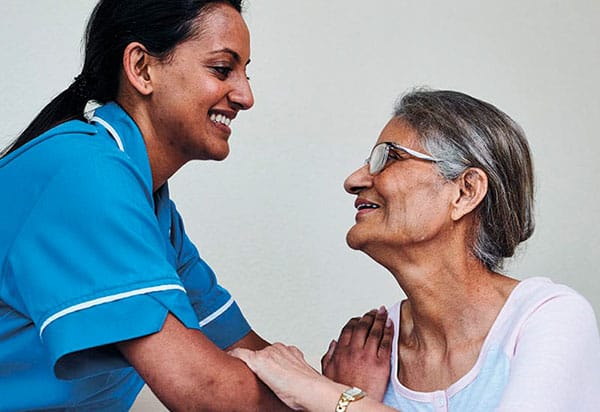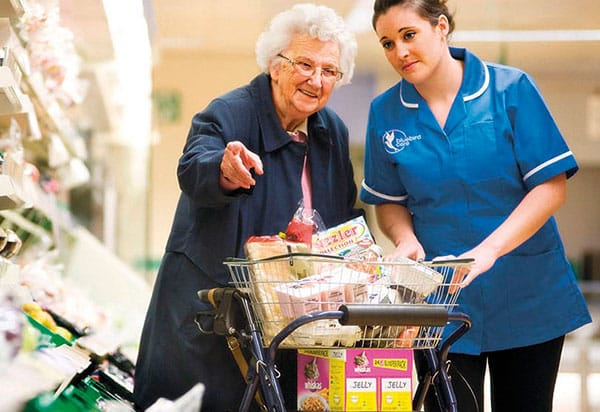What’s it Like to Become a Carer?
Caring is less of a job and more of a calling – one that people answer at all different stages in their life.
19/05/2021
Caring is less of a job and more of a calling – one that people answer at all different stages in their life.

If you’re considering a career in care, there are a few things you’ll probably want to know. Things like: What’s it like to become a carer? How would you spend your first few days and weeks? What training is involved? And when is the right time to take the plunge?
To help answer some of those questions, we chatted with recently recruited Bluebird care assistant Kirsty about changing careers and her time with us so far.
What is it like to be a home care worker?
“My background is in corporate – I worked up in London for 20 years, so completely different to being a carer. Caring is probably the least paid job I’ve had in my life, but the most rewarding job I’ve ever done. I wish I’d done it sooner to be honest – just because I’m having such an impact on people’s lives.
“Seeing someone in the morning, getting them breakfast, getting them washed, then going back at lunch, then back in the evening to get them to bed. The whole cycle of our customer’s day is reliant on carers.
“I can see the joy it brings as well. There are calls where the customer really needs you to sit with them and talk to them because they can’t get out and can’t see family and you just sit there with them. It’s incredible.”
Applying for the role
“I was really nervous applying because my background is not in care at all. But just from start to finish it was great. They were very friendly on interview and I think just the whole care industry is a really nice industry to be in because everyone is caring really. I am a carer myself, but I need caring for too and looking after and Bluebird Care really does look after you.
“I’ve now been in care now just short of eight months. The initial interview process was done over the phone. A lot of it was questions around how would I behave in certain circumstances as a carer, and how would I care for someone in those situations. Then I was given a face to face interview with two girls, found out the following day I’d got the job, and went into my immediate training the week after!
“So, if you do go for a job with Bluebird Care, they don’t keep you hanging on to find out if you’ve got the job. They let you know within 24-48 hours which is brilliant.”

“There were two lots of training. The first was top-level training on different types of medicines and we did quite a bit of roleplay which was really good. The trainer would play the part of the customer and give me a scenario to enact. For instance, if my customer was hard of hearing, how would I deal with and explain administering her eyedrops?
“The first lot also covered the PPE we had to wear, and putting creams on. That’s an especially big one. If a customer has two different types of creams we have to put on, we have to double glove – you can’t have creams going on the same glove.
“The whole time through that training you’re being watched to make sure the process is being done correctly, and they give you feedback if it isn’t.
“Then the second lot of training was all online courses. I think it’s maybe 10 modules which are an hour each to get your care certificate.
“Once you’ve got that you go out on your shadowing with another carer, two or three times. After that you are on your own.”
From shadowing to caring
“I will admit, only shadowing two or three times felt quite daunting. Especially if you’ve never been in care before. You’re looking after people, administering medications and creams and going into somebody’s home to look after them. I wanted to make sure everything was absolutely spot-on.
“I thought ‘I’m never going to be able to do that on my own!’ But my partner said “You’ll be fine” and it turns out that if you are good with people and you can talk to people, and throw yourself in at the deep end, you will be. Caring is certainly not a job if you’re shy or don’t like people!
“Of course, if you genuinely feel you need more shadowing, Bluebird Care would give it to you. But if you feel you can get out there and get to the customers and the rota that’s given to you each Thursday, that’s often the best thing to do.”
Overcoming the doubts
“I remember when I first told my mum I was going into caring, she said “you’ll never be able to do it.” I’ve had a child and she’d seen me struggle with the nappies and things like that. But I found that when you’re caring you have this professionalism about you that it’s your job and you’re there to look after that person and do whatever they need.”
Making a difference
“If you asked me ‘what are the benefits of being a carer,’ I’d say you get a really good feeling when you recognise something in a customer’s health and act on it.
“Because you see them on a regular basis, you know if they’re not right; if something’s wrong with them; if you need to get the GP involved. If you see them and they don’t look right, because you see them every day you know their health is deteriorating slightly or they need a bit more care. It’s just wonderful to work with all the different customers we’ve got, and all sorts of different medical conditions they have.
“It feels incredibly important, too. On our system we have different things we need to look out for. For instance, it could be looking at their skin integrity – is there anything on their skin? Anyone can develop cancers at any age but because we’re looking after them all day, we monitor them and make sure their health is where it should be.
“We pick up on whether they need additional medicines or treatments or whether there’s anything else we can do to provide a better service. That’s what makes a good carer I think. You’ve got to recognise those little gaps and deal with lots of change. I can see one lady in the morning and then when I come back in the evening there’s a medical emergency or I notice a change in her. As her carer, I’m the person that’s best placed to pick up on it.”
Making a career of care
“My experience with Bluebird Care is that they back you 100% through all of the training, online training, shadowing and in your day to day. They’ve now put me through for my NVQ which I’m going to sit this year. They push you forward to progress in your career as a carer, really. Your training is always up to date and they want you to continue training as you go as well.”
Flexibility and work-life balance
“I absolutely love being a carer and the life it lets me lead. A lot of the time I’ll start around 7am each day and finish around 5pm, which gives me and my partner the chance to spend our evenings fishing. Of course, you do have to be quite flexible because evenings and weekend need to be covered, but the hours you say you can work they’ll generally fill for you, which is fantastic.”
A word for those thinking about going into caring
“Just do it. Give it a go. Caring’s not for everyone – there are definitely pros and cons to being a carer. but it’s so fulfilling. And if you try it, you’ve given it a go, you’ve seen what it’s like and if it’s for you.
“The care industry is such a lovely industry to be in, and you’ll be helping people with so many of the basics of their day, like getting them up and getting them washed which they can’t do, or making their food which is a basic necessity.
“For me to be able to be a part of that, for so many customers, is invaluable.”
Thinking of becoming a carer?
If you feel a career in care could be for you, we’d love to hear from you!
You can get a feel for our available roles and meet our team at careers page. Or if you’d like to know more about the pros and cons of being a carer, you can call us on 01903 730 026.


